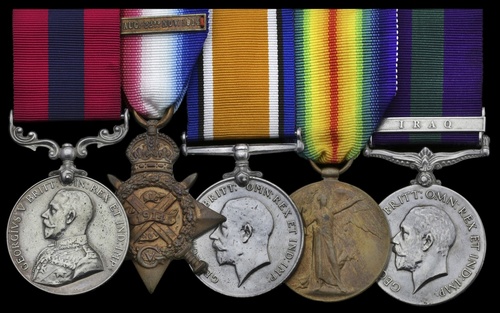
Auction: 20002 - Orders, Decorations, Medals & Space Exploration
Lot: 559
(x) An interesting 'Western Front' D.C.M. group of five awarded to Sergeant J. Cook, Manchester Regiment, who was decorated for extreme coolness under heavy enemy shell fire, yet was tried by Field General Court Martial between the gallant act and its gazetting for allowing a soldier to escape
Distinguished Conduct Medal, G.V.R. (7885 Sjt: J. Cook. 2/Manch: R.); 1914 Star, clasp (7885 L.Cpl. J. Cook. 1/Manch: R.); British War and Victory Medals (7885 Sjt. J. Cook. Manch R.); General Service 1918-62, 1 clasp, Iraq (7885 Sjt. J. Cook Manch. R.), light contact marks and wear throughout, nearly very fine (5)
D.C.M. London Gazette 25 August 1917:
'For conspicuous gallantry and devotion to duty when holding a sap with his platoon under direct enfilade fire. Although half his men became casualties he moved up and down encouraging the remainder to hold on, and at one moment digging out men who had been buried by shell fire, at all times showing a total disregard of danger. By his extreme coolness and devotion he kept his men together in readiness to repel any attempt at an attack on the part of the enemy, displaying personal gallantry of the highest order.'
An account published in the Hull Daily News, 29 October 1917, titled 'From Trench to Altar' and 'Brave Sergeant's Marriage at Skirlaugh' adds a little more detail:
'On 20 June 1917 near Nieuport, this Non-Commissioned Officer was in charge of a platoon holding the Fortin St. Bernard Sap during a heavy bombardment under cover of which it was expected that the enemy would attempt a raid. The sap had no traverses or cover in it and was subject to a direct enfilade from the enemy guns. During the bombardment, though over half his platoon became casualties, this Non-Commissioned Officer moved up and down the sap cheering up his men and proceeded three times to the head of the sap to visit several men who were at their bombing posts. He located five men who had been buried by the bombardment and personally supervised under continual shell-fire the digging out of three of these men. By his personal gallantry under very heavy and accurate artillery fire, by his coolness and devotion to duty and his personal organisation he held his platoon together as a tactical unit ready to repel at any moment an attack on the art of the enemy.'
John Cook was born on 1 June 1888 at Kensington, London, and joined the Manchester Regiment at Ashtead on 1 October 1902, his attestation documents noting his age as just 14 years and 2 months. Educated at Kensington & Chelsea schools, the 'four feet, 3 ½ inches' young man lived with his father at Banstead in Surrey before being posted to the 2nd Battalion in the Rank of Boy on 27 October 1902. Appointed Driver on 16 August 1903 and Drummer on 23 November 1910, Cook witnessed extensive service overseas, including South Africa from 6 January-10 March 1903, Singapore, 11 March 1903-19 December 1904, and nine years in India from 20 December 1904-26 August 1914.
Re-engaging at Jullundur for terms so as to complete 21 years' service, Cook served as a Lance-Corporal in France from 27 August 1914 with the 1st Battalion, Manchester Regiment. Appointed Acting Corporal on 20 September 1915 and Acting Sergeant on 24 January 1916, he was evacuated to England aboard the Hospital Ship St. David on 12 March 1915 in consequence of a gunshot wound to the right shoulder received at Neuve Chapelle. He only returned to the Western Front on 11 November 1916, an indication perhaps as to the severity of the wound and also his likely role in training new troops for Kitchener's 'civilian Army'.
Having already carried out the brave acts which resulted in the award of the Distinguished Conduct Medal, Cook soon found his actions under the scrutiny of his superiors for all the wrong reasons. On 5 August 1917 he was tried by Field General Court Martial for 'allowing a soldier to escape without a reasonable excuse' on 20 July 1917 and was punished by loss of rank. Unperturbed, Cook found happiness with his marriage on 27 October 1917 to Miss Nellie Mawer, the youngest daughter of Mr George T. Mawer, of New Ellerby. Described in the contemporary press as 'a pretty war-time wedding' at Skirlaugh Parish Church, it offered a little joy and respite, although the groom was required back in France on 'Tuesday' (The Hull Daily News, refers).
Remaining with the 2nd Battalion, Cook served in Mesopotamia from 13 February-26 December 1920, before returning to India a further three years. He returned home on 9 April 1924 and finally took his discharge at Preston on termination of his period of engagement on 31 May 1928. His final assessment of Conduct and Character notes:
'Sober, honest, hardworking and a good disciplinarian. Has been employed in various positions of trust and has proved himself to be a thoroughly reliable N.C.O.'
Sold with original Regular Army Certificate of Service, an original copy of the Hull Daily News newspaper, dated 29 October 1917, this a little tatty, a group photo-postcard of Manchester Regiment N.C.O.'s, his copied attestation document, MIC, besides service and casualty records.
Subject to 5% tax on Hammer Price in addition to 20% VAT on Buyer’s Premium.
Sold for
£1,100
Starting price
£550




